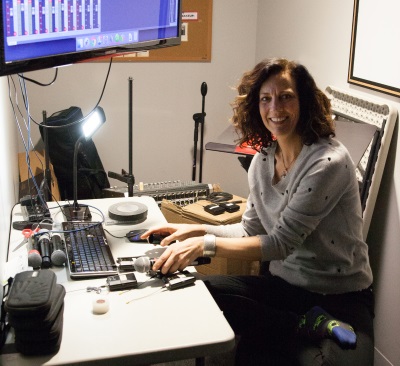
Mixed Signals
Growing up in the Denver suburb of Greenwood Village, Wilson didn’t consider a career in the arts an option.
“My father was an attorney and an atheist. My mother was a minister. So there was not a lot of talking happening in our family. My father listened to classical music, but I was raised like, ‘You’re going to go to college.’ I didn’t even know you could be a professional artist. I studied classical piano from age five onward, but never thought it was something I could link to a career. I was pretty good too, but at age 13, the music school, there were the pencils…”
“The pencils?” I ask. “Yeah, the pencils,” she replies. One day at school Wilson stuck a large quantity of tiny pencils into her classroom’s acoustic tile ceiling – “like stalactites,” she adds. Some might say that’s symptomatic a highly creative personality, but her instructor didn’t see it that way: “I got kicked out.”
Fortunately, it didn’t derail her academic progress, and she went on to attend Colorado State University in Fort Collins, studying communications. There she learned the “nuts and bolts” of audio, literally, by assembling a PA from the performing arts center’s new audio components as part of her job as ‘projectionist.’ She also began mixing local bands and gathering information about audio “incessantly” from anyone who’d talk to her about the craft.

A year after college, Wilson relocated to San Diego to learn to surf and soon landed work in corporate AV and a house gig at the 4th&B club.
When Fishbone played the venue, they were impressed with her work and asked her to mix the rest of their tour. “That was my first tour and I was 21,” she adds. “Then I toured for five years solid.”
Work with a variety of artists followed, where she gained a thorough education in troubleshooting dodgy club systems as well as how to cope with breakdowns in the music industry.
“I learned a lot about working with labels shopping new artists; the hype that oftentimes doesn’t come to fruition, tours that never happen, being on retainer but doing two shows a year, or getting picked up in a limo, but not getting paid.”
The view behind the stage curtain of the music industry isn’t always pretty, she adds: “I advise anyone getting into the business to be aware of their (own) motives – if you think you’re going to have a bunch of fun, you’re right, but you’re also signing up for a lot of hard work. If you find audio scientifically engaging, don’t doubt yourself. Go for it, but ask questions and more questions. That’s how I learned. But check your motives first. If you’re in it for the sensationalism, you’re going to become a mess.”
One job led to the next, she notes, referencing another club gig that helped get her work with Nancy Griffith. “She had a big band – around 50 inputs, and her music is so dynamic that I learned a lot about actually blending the mix in monitors rather than just trying to overcome stage volume.” That opportunity segued into touring with Wilco and, ultimately, to over a decade as monitor engineer with The Bangles beginning in 2001.
“I prefer monitors, but in a way I grew up at front of house. I loved it, but I don’t do well in crowds, ironically. I got heckled a lot doing smaller gigs,” she says. “Once I was mixing a Van Halen cover band while I was off tour doing club shows and they complained about the sound and turned the crowd against me. It was traumatic. I feel safer on stage. Like I said, musicians are my tribe. Front of house is difficult, but mixing for musicians feels like the biggest challenge; you don’t have to get on the bus with the audience after the show.”
Overall, Wilson’s approach to monitors is subtractive: “I don’t talk to musicians about sound. I ask them what they don’t like and remove that. I used to think mixing monitors was about doing it right, but there is no right – I’ve worked for drummers who I can’t believe love their mix, but it’s what they want. It’s not about what I think sounds good.”
Eventually she reached a point where the downside of touring outweighed the benefits. “I had all of this wealth around me, but inside I was miserable,” she explains. “People see the travel, the fancy hotels and rock stars. It’s fun, but what really became difficult was the lifestyle. I had to get off the road to regroup.
“For two years I ran a surf shop, surfed every day and got some clarity. I did go back out with The Bangles, but that was three weeks in Europe and a month or two later an opening slot. I love The Bangles. They’re musically wonderful and amazing women – it wasn’t a bunch of young rock ‘n’ roll guys with drugs everywhere, you know?”
